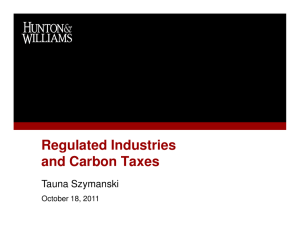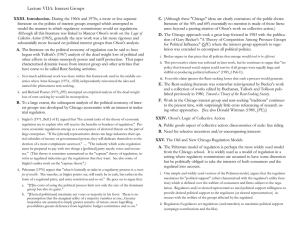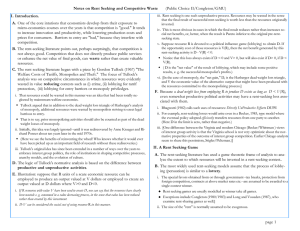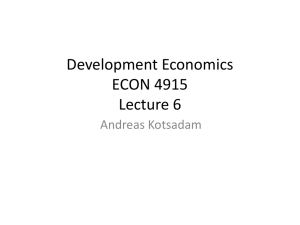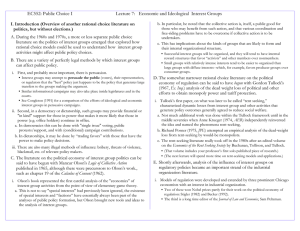Rent Seeking and Political Institutions Encyclopedia of Public Choice I. Introduction Roger Congleton
advertisement
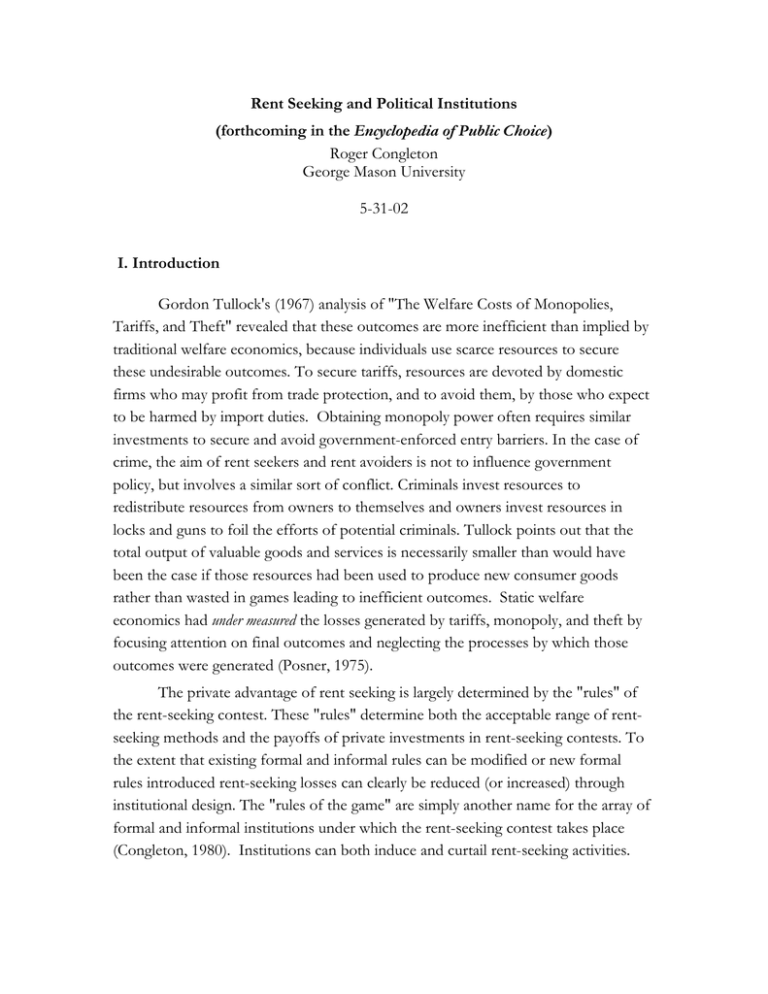
Rent Seeking and Political Institutions (forthcoming in the Encyclopedia of Public Choice) Roger Congleton George Mason University 5-31-02 I. Introduction Gordon Tullock's (1967) analysis of "The Welfare Costs of Monopolies, Tariffs, and Theft" revealed that these outcomes are more inefficient than implied by traditional welfare economics, because individuals use scarce resources to secure these undesirable outcomes. To secure tariffs, resources are devoted by domestic firms who may profit from trade protection, and to avoid them, by those who expect to be harmed by import duties. Obtaining monopoly power often requires similar investments to secure and avoid government-enforced entry barriers. In the case of crime, the aim of rent seekers and rent avoiders is not to influence government policy, but involves a similar sort of conflict. Criminals invest resources to redistribute resources from owners to themselves and owners invest resources in locks and guns to foil the efforts of potential criminals. Tullock points out that the total output of valuable goods and services is necessarily smaller than would have been the case if those resources had been used to produce new consumer goods rather than wasted in games leading to inefficient outcomes. Static welfare economics had under measured the losses generated by tariffs, monopoly, and theft by focusing attention on final outcomes and neglecting the processes by which those outcomes were generated (Posner, 1975). The private advantage of rent seeking is largely determined by the "rules" of the rent-seeking contest. These "rules" determine both the acceptable range of rentseeking methods and the payoffs of private investments in rent-seeking contests. To the extent that existing formal and informal rules can be modified or new formal rules introduced rent-seeking losses can clearly be reduced (or increased) through institutional design. The "rules of the game" are simply another name for the array of formal and informal institutions under which the rent-seeking contest takes place (Congleton, 1980). Institutions can both induce and curtail rent-seeking activities. II. Institutions and the Rent-Seeking Society To see how institutional design affects the magnitude of rent-seeking efforts and losses, consider the following characterization of a rent-seeking society. Suppose that the expected payoffs from contest j are of the form: Rij = sj( fj(xij), gj(xoj)) Pj cj(xij), where xij is the investment by the i-th rent seeking in contest j and xoj is the investment of all other rent seekers. Pj is the prize or profit at stake, fj and gj are influence production functions, cj is a cost function reflecting the value of resources in other non-rent-seeking activities such as farming and leisure. Function sj is a sharing rule or probability function for contest j. It is normally assumed that rentseeking contests are such that relative influence rather than absolute influence determines shares of the prize, or the probability of winning the entire prize. If all players simultaneously double their influence, each player's share of the "prize" is unaffected. Nonetheless, investing in rent-seeking contests can be entirely rational in the sense that self-interest leads individuals and groups to play such socially unproductive games as a means of securing private advantage. The typical rent seeker will invest in rent-seeking contests up to the point where: cj xi = Pj sj F fj xi across all games. That is to say, rent seekers devote resources to a rent-seeking contest up to the point where the expected marginal advantage in pursing the prize equals its marginal opportunity cost, which implies that marginal returns are equalized across rentseeking contests. The level of investment in each game is affected by the magnitude of the prize, the sharing rule, and the production of influence functions, which partly determine sj F and fj xi . Note that both the production of influence and the effect of influence on a player's share of the prize, fj xi and sj F , are partly determined by the efforts of other contestants and partly by the institutions that determine how influence can be produced and how the prize will be divided (for example, winner take all or proportional shares). Both the institutional setting and the magnitude of P are usually assumed to be exogenous. The assumed structure of the sharing rule and influence production functions implies that a grand prisoner's dilemma exists. All players would be better off if every rent seeker's investment was reduced by the same proportion, because this pattern of reduction would not affect individual shares in the prize(s), but would free resource for other more valuable uses. In such contests, essentially all the resources invested in these contests are wasted, insofar as they are consumed by the influence-production processes without increasing the quantity or variety of available goods and services. However, no individual has an interest in reducing his own investment in a rent-seeking contest unless the others do the same. Informally solving this form of the prisoner's dilemma is not an easy task, because as the players reduce their efforts, the advantage of rent-seeking investments tends to increase at the margin for each individual player. "Cheating" on whatever informal rules come to be adopted becomes an increasingly attractive option as effort levels decline. The ability of affected groups to devise and implement formal rules to curtail investments in these unproductive games remains in the interest of all those in the game, insofar as costs can be reduced for all (including the winners). For example, institutions that eliminate the possibility of influence, by setting fj xi = 0, or that eliminate the effect of "influence" on individual shares of the pie, by setting sj F = 0, eliminate all interest in rent-seeking contests by eliminating the gains from rent seeking. The institutional design question is whether such institutions can be adopted, and whether they necessarily reduce rent-seeking expenditures or simply redirect conflict into other channels. Unfortunately, the same incentives tempt individuals to cheat in the ordinary play also exist at the level of institutional reform. Each participant at a constitutional convention naturally prefers rules that increase their own influence relative to potential rivals (Wagner and Tollison, 1991). Moreover, efforts to curtail one form of rent seeking may simply divert efforts to other equally wasteful contests as marginal returns in other "unregulated" games are re-equated. III. Institutional Remedies for the Rent-Seeking Dilemma The rent-seeking literature has demonstrated that a number of institutions can affect the extent of rent-seeking expenditures. For example, if the prize in a particular contest decreases, all rent seekers will realize smaller marginal benefits from their rent-seeking activities in that game. A smaller prize induces each rent seeker to invest less in the game of interest, which also diminishes the total investment in rent seeking in the most commonly analyzed games. Consequently, political arrangements that reduce the fraction of national resources distributed in response to rent-seeking efforts tend to attract smaller individual investments in rent seeking from all rent seekers. Here we may note that private property rights, civil and political liberties, and a takings clause all bound the domain of government policies and tend to reduce the level of rent-seeking loss relative to governments where the domain of public policy is larger. The size of the prize sought by rent seekers is also affected by laws that protect rents once obtained. For example, monopoly contracts may be enforced by a nation's judicial system or not. If cartel agreements are not enforced, increased uncertainty about the value and durability of a monopoly privilege tends to reduce the expected value of the prize and, thereby, the level of effort invested to organized monopolistic organizations, or to create entry barriers. In addition to political and legal institutions that affect the size of the prizes potentially available to rent seekers, rent-seeking contests are also characterized by institutions that determine how individual and aggregate rent-seeking efforts produce influence and how influence affects the distribution of the prize or the probability of winning the prize. The manner in which influence is produced by the efforts of individuals, fj(xij ), and groups is partly determined by procedural rules that determine legitimate methods of producing influence. For example, access to policy makers may be unrestricted, determined by familial ties, political activism, reputation, or lottery, and so forth. Regulatory deliberations may invite only a few people or groups to comment on proposed regulation or many. Campaign contributions may be explicitly linked to votes on pending legislation or only implicitly linked. Bribery may be legal or illegal, and, if illegal, enforcement may be more or less intense. In all these cases, the ability of any interest group to influence the policy outcomes is partly determined by its own efforts, partly those of other groups, and partly by the institutional setting. The institutional setting determines the general productivity of some forms of influence relative to others, and may favor some groups relative to others. For example, entry barriers in rent-seeking contests often reduce rent-seeking losses for those in the game, but imply that some groups can not win the prize, Corcoran, 1984. In addition to the institutions that determine the productivity of alternative methods of producing influence, there are others that determine how the influence produced can affect the assignment of the prize in the contest of interest. In contest environment sketched out above, function sj specifies how influence affects the distribution of the prize among rent seekers. This may be based upon the relative production of influence, or describe a probability function for winning the entire prize is affected by their relative efforts, Sj = sj( f(xij ) , g(xoj )).1 The process that determines the allocation of the prize may be made by a generality rule, a true lottery, a single policy czar, or a committee. Such a committee may choose the winner(s) of the contest using unanimous agreement or majority rule. The prize may be awarded all to one player, distributed only among all those who participate, or distributed within an industry or to all citizens. If the prize is shared, the amounts given out may be equal or unequal, and the shares may be affected by rent-seeking efforts or not. In all these cases, it is clear that both the decision and allocative rules have effects on both the kind and extent of the rent-seeking investments made by each individual rent seeker, and, consequently, on the aggregate rent-seeking losses. For example, majority rule tends to attract smaller investments in rent seeking than oneman rule, and winner take all apportionment rules tend to attract greater efforts than proportional share games or lotteries (Congleton, 1983). Other institutional characteristics of the setting in which the rent-seeking contest is played also affects the size and scope of rent-seeking activities. For example, federalism tends to reduce the size of the prize contested and reduce the number of rent seekers who participate in a particular game (insofar as players must reside within the jurisdictions of interest). Both these effects tend to reduce rentseeking expenditures (Warneryd, 1998). Participation in rent-seeking contests may be sequential as when eligibility for a final prize is determined from a sequence of games (Baik and Lee, 2000). All these analyses demonstrate that the modification of formal institutions is one method by which rent-seeking losses can be controlled, even if rent-seeking losses can not be avoided altogether. Moreover, several models of the emergence of civilization from anarchy argue that political and legal institutions are adopted in order to escape from the Hobbesian jungle, which is an unmitigated rent-seeking society. In these analyses, political and legal institutions are invented "whole cloth" as a means of reducing the waste of resources in rent-seeking games (Tullock, 1972, Skogh and Stuart, 1982, Skaperdas, 1992, and Hirschliefer, 2001). Rationality implies that efforts to devise institutions to address the problems will tend to reflect the potential net advantage of solving particular rent-seeking 1 The most common specification of this relationship resembles a lottery where one's probability of winning the prize or one's share of the prize depends on the number of lottery tickets purchased, xi , relative to total ticket sales, S = xi / ( Σj xj ) . problems. If losses are large, great efforts are worth undertaking. If the costs of solving a problem are low, less effort is necessary to solve the problem. It seems clear that rent-seeking games that generate large losses that can be easily avoided will be revised through institutional reform or ordinary legislation. Laws may be adopted which restrict transfer of real property to nonviolent and voluntary means. Murder, theft, dueling and street racing may be declared illegal and punished. Bribery may be outlawed and violators exiled or jailed. Other productive forms of conflict may be promoted by enforcing contracts and devising transferable packages of use rights.2 If the cost of adopting loss reducing institutions is also large, wasteful rentseeking contests may remain unsolved. For example, violent conflict between nations over boundaries often involves large scale losses, but history suggests that those losses are very difficult to eliminate completely. Moreover, conflict over policies within a nation are inevitable as long as governments are able to adopt policies that have distributional consequences. Insofar as nearly all policies have distributional consequences, it is unlikely that domestic rent-seeking loses can be completely eliminated, although they can be reduced by intelligent institutional design. There are problems for which institutional solutions to rent-seeking losses are unlikely be adopted, and others for which the solutions adopted are unlikely to work in the long run. IV. Institutions and Rent-Seeking Costs If the welfare economists prior to 1967 under counted the cost of tariffs, monopoly, and theft, it is possible that Tullock and others exploring the normative implications of rent-seeking have overstated them. Given human nature, both rentseeking and cost-avoiding efforts by all available means are to be expected. If the costs of rent-seeking can be reduced, it is clearly in the interest of those involved in rentseeking contests to reduce them in some way. If these costs can not be reduced, they would not be costs in the sense that economists use the term but rather technological facts of life analogous to ordinary production or transactions costs (Buchanan, 1969). Both lines of argument imply that the true cost of rent-seeking tends to be smaller than suggested by the literature on rent-seeking contests. 2 Note that the efforts of firms who compete in well-functioning markets resembles rentseeking as far as firms are concerned. However, competition in markets tends to increase the size of the prize to be distributed, and distribute much of that prize to individuals not directly involved in the contest, namely to consumers. The second of these possibilities, what might be called the "transactions cost" argument, is clearly false. Rent-seeking losses can be controlled in a variety of ways as noted above. Formal and informal institutions can reduce rent-seeking losses by changing the rules and rewards of rent-seeking contests. Such rules affect the relative returns of rent-seeking activities within a particular contest and also across the wide range of contests that might be played. In this sense, rent seeking is clearly a costly activity. Whether policy-relevant rent-seeking costs exist or not depends on whether existing formal and informal institutional arrangements have already reduced rentseeking losses as much as is humanly possible. Analysis of rent-seeking contests can direct our attention to reforms that could make us all better off in settings where new institutions can be devised that reduce the losses associated with rent-seeking games. On the other hand, if rent-seeking losses have already been minimized, analysis of rent-seeking advances the conservative policy agenda of defending existing institutions that curtail those losses. In either case, a thorough understanding of rent-seeking contests is clearly central to our efforts to devise more effective institutions and to understand the institutions that we already have. REFERENCES Baik, K. H. and Lee, S. (2000) "Two-Stage Rent Seeking Contests with Carryovers," Public Choice 103: 285-96. Baik, K. H. and Lee, S. (2001) "Strategic Groups and Rent Dissipation, Economic Inquiry 39: 672-84 Buchanan, J. M. (1969) Cost and Choice. Chicago: Markham Publishing Co. Buchanan, J. M. (1980) "Rent Seeking and Profit Seeking," in J. M. Buchanan, R. D. Tollison and Gordon Tullock (eds) Toward a Theory of the Rent-Seeking Society, College Park: Texas A&M Press. Buchanan, J. M., R. D. Tollison and G. Tullock (eds) (1980) Toward a Theory of the RentSeeking Society, College Park: Texas A&M Press. Congleton, R. D. (1980) "Competitive Process, Competitive Waste, and Institutions," in J. M. Buchanan, R. D. Tollison and Gordon Tullock (eds) Toward a Theory of the RentSeeking Society, College Park: Texas A&M Press. Congleton, R. D. (1984) "Committees and Rent-Seeking Effort," Journal of Public Economics 41:441-48. Corcoran, W. J. (1984) "Long-Run Equilibrium and Total Expenditures in Rent Seeking," Public Choice 43:89-94. Hillman, A. L. and Katz, E. (1984) "Risk-Averse Rent Seekers and the Social Cost of Monopoly," Economic Journal 94:104-10. Hirshliefer, J. (2001) The Dark Side of the Force: Economic Foundations of Conflict Theory. New York: Cambridge University Press. Lockhard, A. and Tullock, G. (2001) Efficient Rent Seeking. Boston: Kluwer Academic Publishers. Ngo Van Lang and N. Vousden (1987) "Risk-Averse Rent Seeking with Shared Rents," Economic Journal 97:971-85. Nitzan, S. (1991) "Collective Rent Dissipation," Economic Journal 101: 1522-34. Posner, R. A. (1975) "The Social Costs of Monopoly and Regulation," Journal of Political Economy 83: 807-27. Rowley, C. K., Tollison, R. D., and Tullock, G. (1988) The Political Economy of Rent Seeking. Boston: Kluwer Academic Publishers. Skaperdas, S. (1992) "Cooperation, Conflict and Power in the Absence of Property Rights," American Economic Review 82: 720-39. Skogh, G. and Stuart, C. (1982) "A Contractarian Theory of Property Rights and Crime," Scandinavian Journal of Economics 84:27-40. Tollison, R. D. and Congleton, R. D. (1995) The Economic Analysis of Rent Seeking. Aldershot:Edgar Elgar Publishing. Tollison, R. D. and Wagner R. E. (1991) "Romance, Realism and Economic Reform," Kyklos 44:57-70. Tullock, G. (1967) "The Welfare Costs of Monopolies, Tariffs and Theft," Western Economic Journal 5: 224-32. Tullock, T. (1972) Explorations in the Theory of Anarchy. Blacksburg: Center for Study of Public Choice. Warneryd, K. (1998) "Distributional Conflict and Jurisdictional Organization," Journal of Public Economics 69: 435-50.
